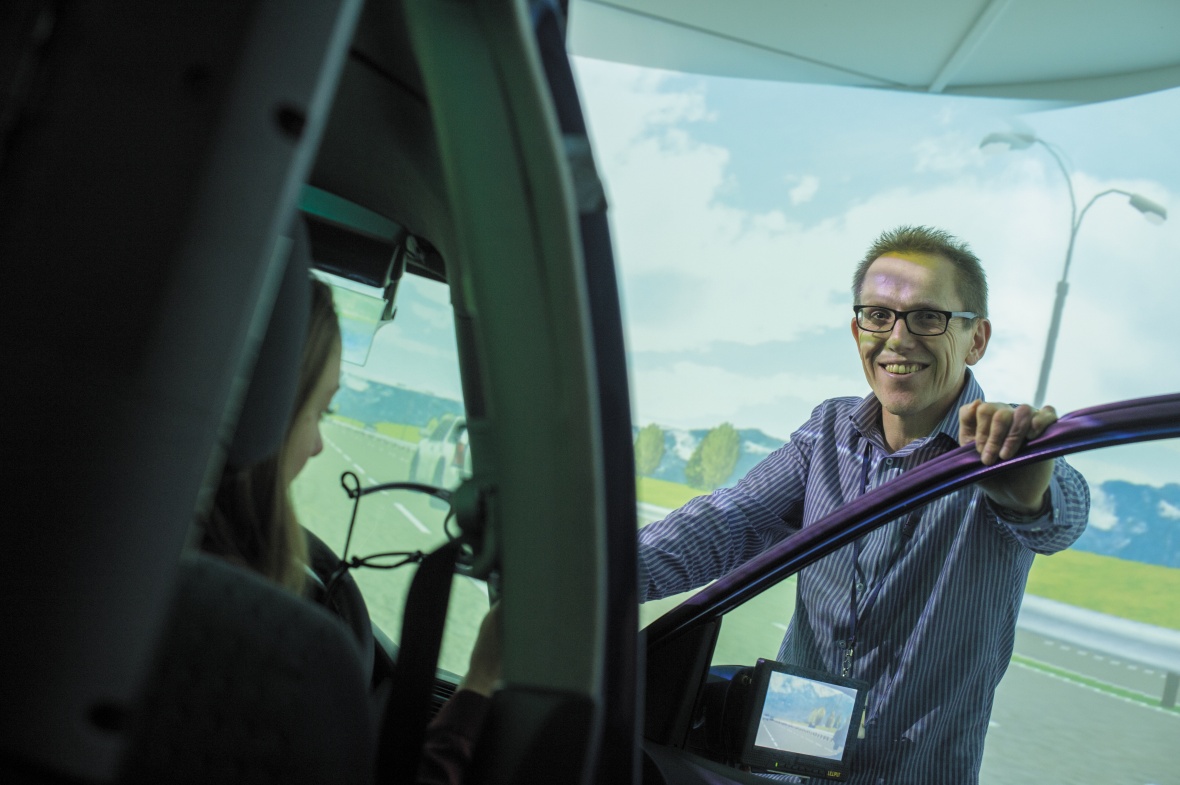The University of Nottingham is part of a new, national initiative to develop a blueprint and business model to make self-driving transport a future reality in cities across Britain.
The hope is that through smart, connected technologies, autonomous vehicles will one day communicate together to improve traffic safety and reduce the congestion that currently blights cities.
The ServCity research project has just launched to help city authorities, policy-makers, budget holders, transport providers and technology-makers successfully incorporate autonomous vehicle technology into urban transport networks.
Over the next 30 months, the University of Nottingham, Nissan, Hitachi, the Connected Places Catapult and TRL (a transport research company) – will develop practical guidance on the best business models to make driverless transport both technically- and economically-viable.
Through a combination of test simulation, end-user experience research and real-world trials using driverless taxis within London, ServCity aims to overcome common barriers to adoption – such as public scepticism - to make the disruptive technology common place.
The Human Factors Research Group (HFRG) at the University of Nottingham will employ applied field-based research methods and novel technologies - including virtual reality, prediction and simulation systems within their lab – to support the optimum design and implementation of an intelligent mobility service.
"There are unanswered questions about how self-driving vehicles will function in the real world, in particular, their abilities to convey their intentions to humans in busy, complex environments. For instance, how do pedestrians know if a driverless taxi is going to start moving or stop or turn a corner or whether it's operating in full automated mode? For ServCity, we will use our expertise in conducting and analysing user studies to explore how people might interact with future automated taxis, both as customers and pedestrians."
"Part of our studies will also focus on accessibility. For example, how will someone with visual impairment hail a taxi or a customer with a physical disability be supported to get their luggage in and out of a cab that has no driver? To this end, the theories, models and methods we employ will help to develop a self-driving taxi service that has a user-centred design which considers a broad range of city inhabitants, and their different needs," Professor Burnett adds.
ServCity is jointly funded by industry and the government's £100m Intelligent Mobility fund, which is administered by the Centre for Connected and Autonomous Vehicles (CCAV) and delivered by Innovate UK.
Business and Industry Minister Nadhim Zahawi said: "If society is to enjoy the benefits of self-driving vehicles, we need to ensure the technology can safely master a complex and lively, modern city, with all its obstacles.
This project, backed by Government funding, will not only help make autonomous cars more user-friendly, but also give consumers confidence that they can respond quickly and safely and to all types of challenges they face on the roads."

Bob Bateman (Project Manager) from Nissan – lead partner on the project – explains, "We are extremely proud to be lead partner on the ServCity project and are excited to trial our fully electric Nissan LEAF as the test vehicle. Our Intelligent Mobility strategy strives to achieve a mobility future that is more electric, more autonomous and more connected and we look forward to working in collaboration with ServCity's other partners to achieve this."
Nick Blake (Chief Innovation Strategist) from Hitachi explains, "The team at Hitachi's European research and development is focused on tackling the complex technical challenges involved in autonomous driving in congested urban environments. Our role in the ServCity project will include developing the technology behind predicting – and safely responding to – other moving objects such as pedestrians, cyclists and cars, as well as delivering accurate and robust localisation solutions."
Edward Mayo (Programme Manager) from the Connect Places Catapult said, "The Connected Places Catapult supports organisations in harnessing emerging technologies and developing new services. ServCity is a perfect example of how we can use this approach to deploy autonomous vehicles on a wide scale to achieve the aim of Intelligent Mobility and improve the movement of both people and goods."
Lucien Linders (General Manager) from TRL, adds, "As world leaders in creating the future of transport, TRL is committed to developing safe systems that are available to everyone. Through using the infrastructure and monitoring facilities at our Smart Mobility Living Lab in London, we are uniquely placed to analyse the performance and benefits of automated mobility services in a complex city environment. We are proud to be offering our expertise to this ground-breaking ServCity project."
Andrew Hart (Director) from SBD Automotive explains: "Robotaxis have the potential to fundamentally transform mobility for both consumers and the cities they operate in. The user experience lies at the heart of that transformation, as operators will need to carefully balance customer expectations with real-world technological constraints. SBD is proud to be a part of the ServCity project, bringing our decades of hands-on experience from working with car makers to help define and test different approaches to delivering a seamless Robotaxi experience."






